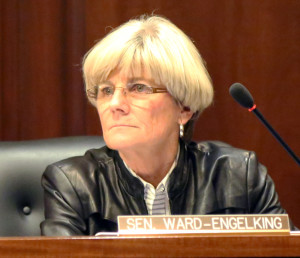Senate Bill 1248 may be the shortest education-related bill of the 2016 session.
All it does is delete a line from state law: one that requires charter schools to use teacher contract forms approved by the state’s superintendent of public instruction.

But that small change has prompted a big debate — dividing education stakeholders and even charter school officials. As Sen. Janie Ward-Engelking, D-Boise, said in debating against the bill Monday, “Striking one line changes everything.”
Why the long debate over such a short bill? Let’s take a closer look.
What would SB 1248 do? If it passes, charter schools would have wide latitude in writing teacher contracts. They could decide to sign all teachers to one-year contracts, for example — or even make their teachers at-will employees.

Supporters stress that SB 1248 is voluntary; if they so choose, charter schools can keep the contracts they’re using now. And SB 1248 wouldn’t affect existing contracts — only new hires in charter schools.
What’s the history? When Idaho passed its charter school law in 1998, charters could use any contract language they wanted. In 2004, charters were brought under teacher contract law.
What’s the national context? Idaho has one of the most restrictive charter school contract laws in the nation. Blue states such as New York and California have relaxed charter contract laws, says Emily McClure, a lobbyist for the Idaho Charter School Network, which supports SB 1248. In two neighboring states, Oregon and Utah, most charter school teachers are at-will employees.
What’s the current state of teacher contracts? That changed in 2015, when Gov. Butch Otter signed the career ladder. The teacher salary plan sets up two groups of teachers. During a three-year residency status, beginning teachers essentially work on a one-year basis. After passing residency status, teachers move to professional status. That doesn’t give teachers tenure — and teachers still can be fired — but the professional status affords increased contract protection. That’s important in the context of SB 1248.
Why the push for SB 1248? Charter administrators say SB 1248 would give them more flexibility as they recruit and hire teachers. This flexibility would also make it easier for charters to fire teachers who aren’t getting results in the classroom, or no longer buy in to a charter’s mission or philosophy.
So, charter schools really want this change? Not necessarily.
Consider the mixed message the Senate Education Committee heard on Feb. 9, when it held a hearing on SB 1248.
Senators heard from McClure and charter teachers and administrators, including Michelle Ball, a founder of Alturas International Academy, an Idaho Falls charter school due to open this fall. Ball said her school will need teachers who can work in a fluid mastery-based setting, where students move between grade levels during the school year. By the same token, she said, the school needs to be able to get rid of teachers who cannot handle the pace. “A year with a teacher of this caliber is life-altering for many students.”
Senators also heard from Randy Yadon, administrator and principal at Meridian Technical Charter High School, a school that boasted some of Idaho’s highest SAT scores in 2015. Yadon opposes SB 1248. He fears that a charter school would become “a stepping stone to a real teaching job,” where educators have contract protections.
“All public education teachers can, and should, expect a minimum standard of assurance from the state as to their contract property rights,” he said.
Where does Sherri Ybarra stand on this? In essence, SB 1248 would give the state superintendent less say over teacher contracts in charter schools.
However, Ybarra has no position on the bill, spokesman Jeff Church said this week.
Where do education groups stand? They’re opposed.
The Idaho School Boards Association wants the bill killed — and their charter school members are leading the opposition, executive director Karen Echeverria said.
The Idaho Association of School Administrators has unanswered questions — namely, about how SB 1248 would affect teachers who move from traditional schools to charter schools, or vice versa.
The Idaho Education Association opposes the bill as well. Among the union’s concerns: SB 1248 would create two classes of teachers, just as the career ladder ties salary increases to renewable teacher contracts.
It’s not uncommon for these three influential groups to line up on the same side of a contentious education issue. But lawmakers sometimes go against the wishes of these three stakeholder groups — as the Senate did Monday, when it passed SB 1248 on a 22-13 vote.
What’s next? The House Education Committee is scheduled to take up SB 1248 on Friday morning. If it passes in committee, and on the House floor, it would go to Otter’s desk.
Where does Otter stand? Spokesman Jon Hanian wouldn’t say.
“The governor doesn’t comment on legislation until and unless it reaches his desk, unless it’s his legislation,” Hanian said in an email this week.
